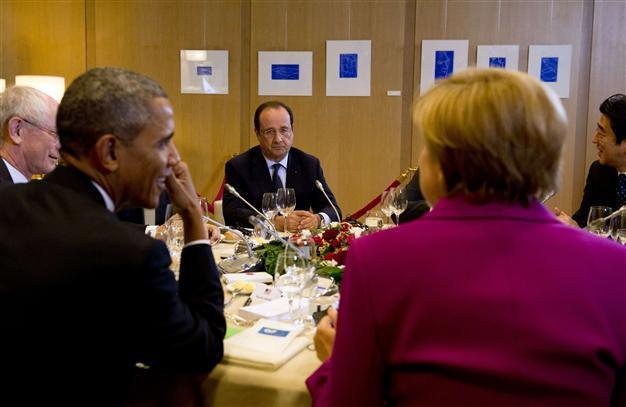G7 warns Russia to curb Ukraine unrest or face more sanctions
BRUSSELS - Agence France-Presse

US President Barack Obama, President of the European Council Herman van Rompuy, France's President Francois Hollande, Japan's Prime Minister Shinzo Abe, Germany's Chancellor Angela Merkel attend a working dinner at the G7 summit at the European Council headquarters on June 4, 2014 in Brussels. AFP Photo
World leaders urged Vladimir Putin on Wednesday to stop destabilising Ukraine or face further sanctions as they met without a Russian president for the first time since the 1990s.Putin reached out a hand despite being banned from the Group of Seven summit following Russia's annexation of Crimea in March, saying that he was ready to meet Ukraine's president-elect.
But G7 leaders said that while they still hoped for "constructive" talks with Putin on the sidelines of D-Day commemorations in France on Friday, Moscow could face further punitive measures.
In a joint communique they said Putin must recognise the results of Ukraine's May 25 presidential election, won by Petro Poroshenko, stem destabilisation in the east of the country, and pull Russian troops back from the border.
"Actions to destabilise eastern Ukraine are unacceptable and must stop," the group said.
"We stand ready to intensify targeted sanctions and to implement significant additional restrictive measures to impose further costs on Russia should events so require."
US President Barack Obama earlier hit out at Russia's "dark tactics" in Ukraine in a hawkish speech in Warsaw that harked back to some of the darkest days of the Cold War.
Obama has shown no signs of wanting a meeting with Putin despite the fact that both will be in Normandy to mark the 70th anniversary of the World War II D-Day landings in Europe.
Other G7 leaders whose economies are more exposed to Russia than Washington took a softer tone.
German Chancellor Angela Merkel said that European leaders would "take stock" of Russian actions at a summit end June and "reflect which further sanctions are necessary".
But Merkel, who is due to meet Putin in France, said that "the main thing is to be constructive" and that further sanctions would take effect only if there had been "no progress whatsoever".
French President Francois Hollande -- who is scheduled to have separate dinners with both Putin and Obama in Paris on Thursday -- agreed that "dialogue and deescalation must be encouraged". British Prime Minister David Cameron said he would be taking a similar message to Putin when he meets him also on Thursday.
Putin hinted that he could meet both Poroshenko and even Obama, saying "I don't plan to avoid anyone".
But he taunted the United States and waved away allegations of Russian military meddling in eastern Ukraine.
"Proof? Let's see it!" he said. "The entire world remembers the US secretary of state demonstrating the evidence of Iraq's weapons of mass destruction, waving around some test tube with washing powder in the UN Security Council".
The worst East-West crisis in decades dominated Thursday's G7 talks, a summit due to have been hosted by Putin in the Black Sea resort of Sochi but switched to Brussels in the anger that followed Moscow's wresting of Crimea from Ukraine in March.
The crisis began when then Ukrainian president Viktor Yanukovych rejected an association deal with the EU late last year, triggering protests that ended in his downfall in February and were followed by months of clashes between the new government and pro-Moscow rebels.
Obama earlier promised years of US support for Ukraine and for ex-communist NATO states, plus a $1 billion fund for new military rotations through Eastern Europe.
"How can we allow the dark tactics of the 20th century to define this new century?" Obama asked in his Warsaw speech marking 25 years of Polish democracy after the Cold War.
Earlier, Defense Secretary Chuck Hagel announced in Brussels a review of the US forces' presence in Europe in a sign that Washington is not backing down.
Obama met Poroshenko three days before his inauguration and declared himself "deeply impressed" by the chocolate tycoon Ukrainians chose to lead them back from a political and economic precipice.
On the second and last day of the G7 summit Ukraine is again expected to dominate the talks, with Europe's gas dependency and energy security, climate change, an ambitious EU-US trade pact and the global economy also high on the agenda.
Leaders will meet again from 0730 GMT. Their talks will be followed by a press conference scheduled for 1215 GMT.
















